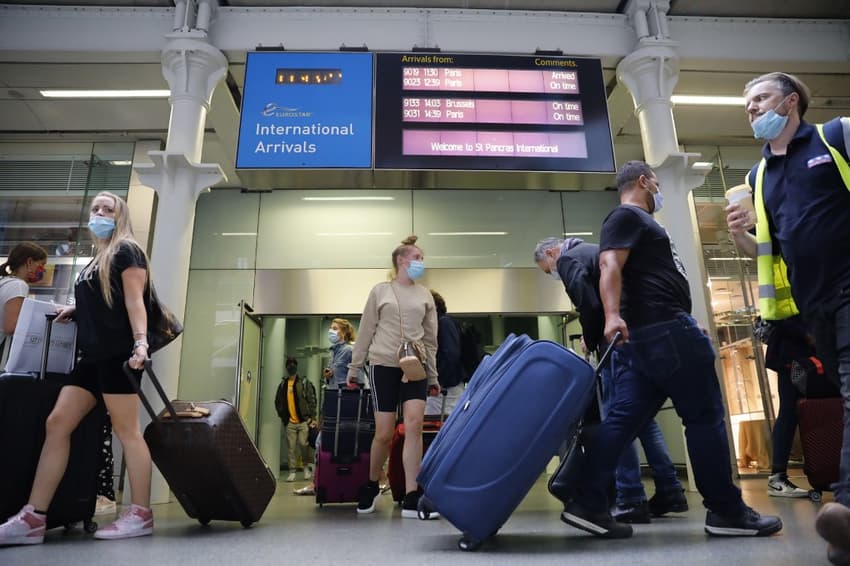Brexit: European nationals warned of change in travel rules when visiting UK in future

European nationals have been warned that the rules to enter the UK will change in autumn next year, meaning ID cards will no longer be accepted at the border.
Britain's Home Office has sent out a reminder to nationals of EU countries as well as Switzerland, Iceland, Liechtenstein and Norway that from October 1st 2021 national identity cards will no longer be valid to enter the UK.
From that date onwards nationals of all EU countries plus Switzerland, Norway, Iceland and Liechtenstein will only be able to enter the UK using their passport.
We are phasing out the use of national identity cards as a valid travel document. From 1 October 2021, most EU, EEA and Swiss nationals will require a passport to travel to the UK.
➡️ https://t.co/OdGkDdvRbK pic.twitter.com/DrpQkVW8q0
— Home Office (@ukhomeoffice) October 8, 2020
However there will be some exceptions.
The Home Office states that these nationals can continue to use national ID card to enter the UK until at least 31st December 2025 if they:
-
have settled or pre-settled status under the EU Settlement Scheme
-
have a frontier worker permit
-
are an S2 Healthcare Visitor
-
are a Swiss Service Provider
"You can still enter the UK using a passport which expires in less than 6 months," the Home Office states.
Europeans have been told that after the end of the Brexit transition period on December 31st, 2020 they will still be able to travel to the UK without needing a visa if they are arriving for a short stay or holiday.
The end of the transition period will also have an impact for British nationals who wish to travel in the EU after January 1st 2020.
Until the end of the transition period British nationals can travel freely throughout Europe and must only make sure their passport is valid for the duration of their trip.
However the rules are stricter after January 1st.
"From January 1st 2021, you must have at least six months left on an adult or child passport to travel to most countries in Europe (not including Ireland)," the UK government says.
For more on how travel will change in 2020 click on the link below.
REMINDER: What Brits in Europe need to know about travel after December 31st

Comments
See Also
Britain's Home Office has sent out a reminder to nationals of EU countries as well as Switzerland, Iceland, Liechtenstein and Norway that from October 1st 2021 national identity cards will no longer be valid to enter the UK.
From that date onwards nationals of all EU countries plus Switzerland, Norway, Iceland and Liechtenstein will only be able to enter the UK using their passport.
We are phasing out the use of national identity cards as a valid travel document. From 1 October 2021, most EU, EEA and Swiss nationals will require a passport to travel to the UK.
— Home Office (@ukhomeoffice) October 8, 2020
➡️ https://t.co/OdGkDdvRbK pic.twitter.com/DrpQkVW8q0
However there will be some exceptions.
The Home Office states that these nationals can continue to use national ID card to enter the UK until at least 31st December 2025 if they:
- have settled or pre-settled status under the EU Settlement Scheme
- have a frontier worker permit
- are an S2 Healthcare Visitor
- are a Swiss Service Provider
"You can still enter the UK using a passport which expires in less than 6 months," the Home Office states.
Europeans have been told that after the end of the Brexit transition period on December 31st, 2020 they will still be able to travel to the UK without needing a visa if they are arriving for a short stay or holiday.
The end of the transition period will also have an impact for British nationals who wish to travel in the EU after January 1st 2020.
Until the end of the transition period British nationals can travel freely throughout Europe and must only make sure their passport is valid for the duration of their trip.
However the rules are stricter after January 1st.
"From January 1st 2021, you must have at least six months left on an adult or child passport to travel to most countries in Europe (not including Ireland)," the UK government says.
For more on how travel will change in 2020 click on the link below.
REMINDER: What Brits in Europe need to know about travel after December 31st

Join the conversation in our comments section below. Share your own views and experience and if you have a question or suggestion for our journalists then email us at [email protected].
Please keep comments civil, constructive and on topic – and make sure to read our terms of use before getting involved.
Please log in here to leave a comment.